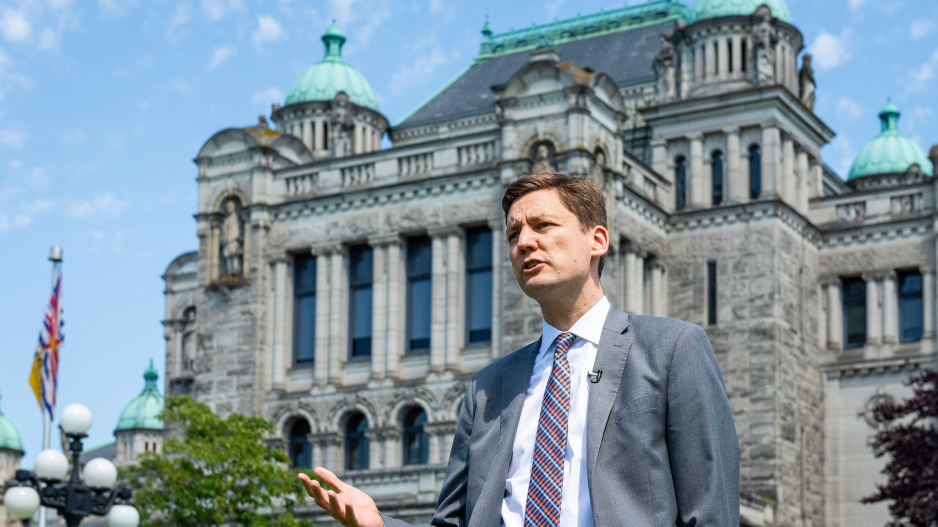Senior B.C. government employees are not subject to statutory financial disclosures, a key component of mitigating conflicts of interest and the potential for corruption.
It’s a matter that is now on the radar of Attorney General David Eby, following inquiries from Glacier Media.
“I was surprised,” said Eby, who noted his office has not found documented disclosures for public servants under the Financial Disclosure Act as far back as 1974, when the act took form.
“As far as we’ve been able to determine, which may or may not be correct, there’s no example of provincial employees required to disclose under this act.
“Which is pretty remarkable,” said Eby, who is now pledging action.
Eby said his office would pencil in a legislative review of the act next year. He said staff would be researching best practices in provinces across the country.
The act does provide the framework for designating public servants for the purpose of annual financial disclosures and for such documents to be disclosed in confidence to elected officials in public bodies such as school boards, city councils or the provincial cabinet. In the case of municipalities, a bylaw or resolution may designate employees, typically senior managers, who would then disclose to the head clerk, who in turn shares the disclosures in confidence to council members.
However, B.C. has no legislation designating provincial employees. If there was, the act deems it would be up to the “provincial secretary” to collect the disclosures and hand them to cabinet for review each year. While the title of “provincial secretary” doesn’t technically exist – highlighting how outdated the act is – it is understood by Eby that the attorney general would hand disclosures over to cabinet.
Eby acknowledged “it’s a good idea that people think consciously about conflicts and disclose.”
Disclosures include assets, such as shareholdings, creditors and interests in businesses, organizations and property.
On May 15 Eby’s government announced a public inquiry into money laundering, mostly as it relates to casino transactions and real estate. A key focus is expected to be how public servants addressed problems, and the orders they received from elected officials.
Canada is a signatory to the United Nations Convention Against Corruption, ratified by every country, aside from Syria, North Korea, Somalia and Suriname and Eritrea. It states: “Each State Party shall consider establishing, in accordance with its domestic law, effective financial disclosure systems for appropriate public officials and shall provide for appropriate sanctions for non-compliance.”
Eby said his task will be not only to assess what provincial public servant positions should require disclosure, but also to determine whether the existing act has the sufficient “tools” to require full disclosure.
Eby said senior deputy ministers and assistant deputy ministers come to mind, and anyone else who is in charge of procurement.
Unlike annual financial disclosures for elected officials, the act stipulates public servant disclosures not be made public. This is in stark contrast to the United States and some European countries, for example.
In the U.S., high-level executive disclosures are also to be posted on the Internet for public availability, searching, and downloading – also in stark contrast to the requirements followed by B.C. municipalities.
Government watchdog Dermod Travis, director of Victoria-based organization IntegrityBC, said there needs to be a debate as to whether public servant financial disclosures, or at least parts of them, are made public.
“I certainly don’t think that it is only disclosed to council is adequate,” he said. “There is going to have to be a happy medium struck between the rights of taxpayers and the rights of the individual to privacy on this matter.”
A 2003 OECD white paper notes, “While it is generally considered appropriate that declarations of assets and interests by elected officials should be open to public scrutiny, it may be considered better in the case of civil servants to provide instead for their declarations and disclosures to be available only to the relevant agency head.”
Despite the province’s shortcomings on disclosures, Eby and his staff noted the new Public Interest Disclosure Act was introduced in 2018, and work is underway to bring it into force. It is intended to strengthen whistleblower protection within the government. Eby said the act would address deliberate efforts to interfere with access to information rights — a concern raisedby the BC Freedom of Information and Privacy Association in April 2018.
Additionally, there is the Ethics and Standards of Conduct in the BC Public Service policyto help expose conflicts of interest with an honour system disclosure process. “Employees must arrange their private affairs in a manner that will prevent real, perceived, or potential conflicts of interest from happening,” the policy states.
Travis has followed closely the B.C. Legislature scandal, in which provincial clerk Craig James resigned May 16 after an independent report found he had misused the treasury for personal purposes. Senior employees at the Legislature are also not subject to financial disclosures, according to house documents manager Jennifer Horvath.




